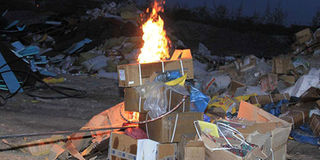To revive local manufacturing, first outlaw counterfeit imports

Contraband goods are destroyed on August 31, 2018. They negatively affect the local manufacturing sector. PHOTO | FILE | NATION MEDIA GROUP
What you need to know:
- The story of the collapse of our manufacturing industries is a familiar one of cheap unregulated imports, mostly from China.
- When the government’s quality control officials allow in counterfeit goods, they are directly dealing a body blow to local manufacturers.
The menace of uncontrolled imports and counterfeits came to me first-hand when I recently visited a relative in Limuru and, as he narrated how life in the town had changed for the worse, he informed me that the Bata Shoe Company was no longer what it once was.
The factory has drastically downsized under the glut of cheap imports from Asia.
To survive, it has been forced to import brands from markets where costs are lower, to do rebranding, and to mass retail shoes as its smaller competitors do.
Limuru was once synonymous with shoe manufacturing. And the Bata Shoe Company was the iconic entity of the town.
Kenyans of a certain age can remember the first pair of shoes they wore were most probably Bata; tough, sturdy shoes which were designed not always for aesthetic beauty but for their durability and friendliness to the pocket. Products like Safari Boots were then a household name.
Bata has been hit hard by cheap imports, many of them contraband. It is a no brainer that Kenyans will go for cost, rarely quality.
BUSINESSES KILLED
The imports were getting cheaper and cheaper, as they flooded the market from places in Asia.
Meanwhile, the costs associated with production and doing honest business were hurting Bata: cost of raw materials, rising wages, high taxes and maintaining a nationwide network of agents and distributors.
Too bad the importers had comparatively less capital costs, and could thus easily undercut Bata.
The story of the collapse of our manufacturing industries is a familiar one of cheap unregulated imports, mostly from China.
The trend started in the 1980s, accelerating in the 1990s and 2000s to date. This has affected familiar companies which were powerhouses in their day.
One of the victims was Firestone, the biggest local tyre manufacturer of the 1980s and 1990s. It was forced to close shop by the same scourge of cheap Asian imports.
JOB LOSSES
Now it is in the same survival game of importing from cheap manufacturing countries and retailing those tyres like its competitors.
The Firestone factory in Nairobi faced the additional misfortune of huge electricity bills, which cut its margins to uncompetitive levels.
A similar fate affected its sister company Eveready, a maker of battery cells whose Nakuru factory shut its doors some years back, unable to cope with a flood of cheap battery cells from abroad.
A pity, because thousands of employees have lost their jobs with these factory closures. Their dependants have of course suffered too.
To revive our manufacturing base, counterfeits must be outlawed. So must the corrupt importation of untaxed contraband goods.
There is no other way President Uhuru Kenyatta will achieve his Agenda Four goal of reviving manufacturing.
When the government’s quality control officials allow in counterfeit goods, they are directly dealing a body blow to local manufacturers.
The cost of electricity must also come down. It is a miracle the cement manufacturers of Athi River are still in business when power has become so expensive.
To stay afloat, they have resorted to raising the price of cement to levels the consumer finds prohibitive.
PRODUCTION COST
Does the government expect its other Agenda Four objective – affordable housing – will be achievable when the cost of construction materials has gone through the roof?
Once upon a time, Thika used to be referred to as “the Birmingham of Kenya” because of its industries and vehicle assembly plants. It took a bad beating in the 1980s and 1990s, too.
It is only now starting to revive, with new vehicle plants, edible oils production (Bidco), and chemicals to add to its traditional food processing mainstay spearheaded by the Del Monte company.
But the recovery is fragile, and threatened by uncontrolled imports of edible oils which are hurting Bidco.
Mombasa, Kisumu, Nakuru and Eldoret were all hit hard by the downturn in manufacturing as our economy went into a tailspin.
To breathe new life into collapsed industries, the government must take the right and obvious measures.
* * *
Cut corruption and the costs of our bloated government. It would be ideal if we could shrink the governance structures that greatly burden the country, but you can rest assured the assorted fat cats who live off the government like ticks will fight tooth and nail against this.
Yet with the heavy burden of debt bearing down on us, we must streamline.
The embattled Nairobi County Assembly Speaker Beatrice Elachi revealed a window of the waste and extravagance in public bodies when she said that she had some medical condition that makes her fly only First Class.
Medical condition my foot! And why should MPs and MCAs even fly Business Class? I am told US ambassadors fly Economy, and they represent a much richer country.
We are a country where the priority is to finance the extravagant lifestyles of officialdom.





